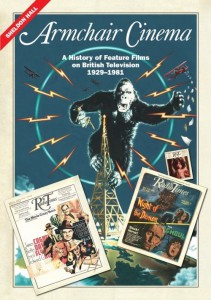Armchair Cinema
A History of Feature Films on British Television, 1929-1981
de Sheldon Hall


Moyenne des votes : ![]()
| 0 | vote | |
| 0 | vote | |
| 0 | vote | |
| 0 | vote |
Votre vote : -
Description de l'ouvrage:
Sight & Sound's Editors' Choice: September 2024
A history and analysis of how films have figured in TV programming in the UK and the role that British television services have played in changing the nature of film entertainment
• Comprehensive coverage spanning the history of TV broadcasting in the UK
• New research utilising extracts from rare archival sources never previously published
• Original angle on the complex historical relationships between the film and TV industries
• Fresh case studies of how particular films and genres have been presented on British TV
Since broadcast television first emerged as a serious alternative to the cinema, more people have seen films on TV than by any other means. Feature films originally made for the big screen were initially withheld from TV by the film industry in the competition for audiences. Struggles between film and television interests settled into a truce in the mid-1960s, since when thousands of films have been shown on British terrestrial television each year. They assumed particular importance in the 1970s and 1980s, when cinema blockbusters became major TV events and themed seasons gave viewers access to many older movies.
This book provides a comprehensive history and analysis of the ways in which cinema films have figured in TV programming in the UK and the role that British television has played in changing the consumption of film entertainment.
À propos de l'auteur :
Sheldon Hall is an Emeritus Fellow at Sheffield Hallam University, UK. A former film journalist, he has contributed to numerous books and journals on British and American cinema. He is the author of Zulu: With Some Guts Behind It (2005/2014), co-author of Epics, Spectacles, and Blockbusters: A Hollywood History (2010), and co-editor of Widescreen Worldwide (2010) and Film Critics and British Film Culture (forthcoming in 2025).
Revue de Presse:
Often uneasy bedfellows, cinema and television have nonetheless always been in a relationship. In Armchair Cinema, Sheldon Hall’s meticulous archival research informs an illuminating history of where many films find their biggest audience – at home. This is the untold story of feature films on the small screen in Britain (1929-1981).– Justin Smith, Professor of Cinema and Television History, De Montfort University
"Sheldon Hall's pioneering Armchair Cinema examines in forensic detail - with a wealth of fascinating archival material - the history of the often stressful relationship between broadcasters and the film industry, and of the changing status of film in television programming, in the process laying the foundations for a fertile new area of media studies. This is an important and absorbing book."– Sir Christopher Frayling, Emeritus Professor of Cultural History Royal College of Art and Visiting Professor of Arts, University of Lancaster
Hall packs his pages with so many compelling stories. Learn how the Carry On comedies doubled box office after broadcast, how sneaky U.S. distributors passed off Edgar Wallace and Sherlock Holmes flicks as TV shows to get around a limit, and why a UK exec was "utterly revolted" by 1933’s King Kong. King Kong!– Rob Lott, Flick Attack
From scheduling to censorship, Hall covers plenty of ground, such as the first movie broadcast on British TV in 1937 – not The Student of Prague (1936), as often claimed, but western The Last of the Clintons (1935) – through to the start of the 1980s. I keenly anticipate the proposed second volume.– Pamela Hutchinson, Sight & Sound, Editors' Choice: September 2024
Rigorously researched and illustrated with schedules and magazine-cover arts, it's a compelling vision of days of TV past.– Joel Harley, Total Film
There will be nostalgia here for those who grew up on late-night horror screenings in the 1970s or the black-and-white films that filled many a rainy weekend afternoon. It is an authoritative and impressive piece of research, presented with a dry wit, and comes highly recommended.– Adrian Smith, Cinema Retro
Entirely accessible with wry wit and occasional clearly-unresisted puns. (The chapter on editing films for television is called "Abridged Too Far".) If you have any interest in the subject, it's essential reading.– Gary Couzens, CineOutsider
Armchair Cinema is full of gems, and demands a sequel covering the glory years of Channel 4 - and the retreat into English-language cinema during the 1990s.– Henry K. Miller, Sight and Sound, October 2024
Voir le site internet de l'éditeur Edinburgh University Press
> Du même auteur :
Epics, Spectacles, and Blockbusters (2010)
A Hollywood History
de Sheldon Hall et Steve Neale
Sujet : Countries > United States
> Sur un thème proche :
Channel 4 and British Film Culture (2014)
Dir. Paul McDonald et Justin Smith
Sujet : Countries > Great Britain
Channel 4 and the British Film Industry, 1982-1998 (2024)
de Laura Mayne
Sujet : Countries > Great Britain
Colour Films in Britain (2022)
The Eastmancolor Revolution
de Sarah Street, Keith M. Johnston, Paul Frith et Carolyn Rickards
Sujet : Countries > Great Britain
Early British Animation (2019)
From Page and Stage to Cinema Screens
de Malcolm Cook
Sujet : Countries > Great Britain
The Dream That Kicks (2017)
The Prehistory and Early Years of Cinema in Britain
Sujet : Countries > Great Britain